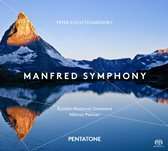|
Back
05/26/2014
Peter Ilyich Tchaikovsky: Manfred Symphony, Opus 58
Russian National Orchestra, Norbert Gembacza (Organ), Mikhail Pletnev (Conductor)
Recording: DZZ Studio 5, Moscow (April 2013) – 59’29
SA-CD Hybrid Multichannel Pentatone # PTC 5186 387 – Booklet in English and German

   
Literary works often segue into musical formulations, especially in the Romantic Era. Lord Byron’s dramatic poem, Manfred (1816-1817), encased elements of the supernatural world that the author likely penned as a venting of his previous indiscretions in London. Robert Schumann created incidental music for this subject in 1852, followed by Tchaikovsky in 1885. While visiting a dying friend in Davos, Switzerland, Tchaikovsky was absorbed by this mountainous terrain. Simultaneously, he read Byron’s work. This combination made such an indelible impression on him that he quickly jumped at the opportunity to create his own Manfred Symphony, a score possessed with high intensity and emotion.
Manfred is an “orphan” since Peter Ilyich Tchaikovsky considered this a “Symphony” yet no number was ever connected to the composition. More succinctly, however, would be to label this as a “tone poem” that closely follows Byron’s writing. Yet to this date, alas, Manfred is never given its proper due as one of Tchaikovsky’s prominent works, having been eclipsed by other more familiar pieces. So here we have Pentatone capturing this turbulent music with dramatic, unrestrained hype which helps argue the notion that Tchaikovsky’s translation has defined substance, arguably the composer in many ways lived vicariously within the protagonist’s quasi surnaturel dilemmas.
Mikhail Pletnev’s orchestra unveils Manfred through a moody bass clarinet/bassoon conglomeration that maps the composition’s leitmotif thematic values. The first movement within the first section (“Lento lugubre”) encapsulates Manfred’s idealistic visionary love, Astarte. The Russian National Orchestra conveys Byron’s doomed man with somber vibrancy as a lost and discombobulated being. In the second section we get a bit of emotional reprieve with encouraging reminiscences. Within this “Moderato con moto” (9:15) one will suddenly hear very close ties to the opening of Eugene Onegin (1879) that certainly permeated the composer’s Manfred six years later. The “Andante” brings us back full cycle with its emotionally exhausting ending.
The ensuing “Vivace con spirito” is blanketed in scherzo-like qualities: light in rhythm, yet subconsciously lurking inside the muddied predominant theme. Though not lasting too long, a subsequent musical diction surfaces that elevates into a clearly defined optimistic melody. As the piece progresses, however, there is a bit of lingering tentativeness. Complacency never quite establishes itself.
The “Andante con moto” bounces back and forth between bucolic politeness and Manfred’s bristling. The 6/8 beat trumps over the Manfred quandaries (3:58) with a breeze of idyllic happiness. In the end, however, it is the country pleasantries which lay a mat of peace within the middle of such a tumultuous work.
Mikhail Plentev’s orchestra markedly unveils its talent during the final “Allegro con fuoco.” At this point Tchaikovsky lashes out with all sorts of instrumental “weaponry” giving the section true color and captivating hellish outcries. Pletnev’s brass staccatos are excellent, the piccolo flares with pinpricks, the tambourines snap with sharpened fieriness, all which help depict the bacchanal orgy at hand. Harp glissandos help quell the wildness of the music and bring us back to first base. Fate is finally established, the Manfred theme prevails, and Swan Lake (1875-1876) will come to mind. But then sharply we turn to the iridescence of Norbert Gembaczka’s organ apotheosis. One can’t help but think back to works of like nature and see Faustian translations positioned. The B major chord gives Manfred a sigh of relief.
Christie Grimstad
|